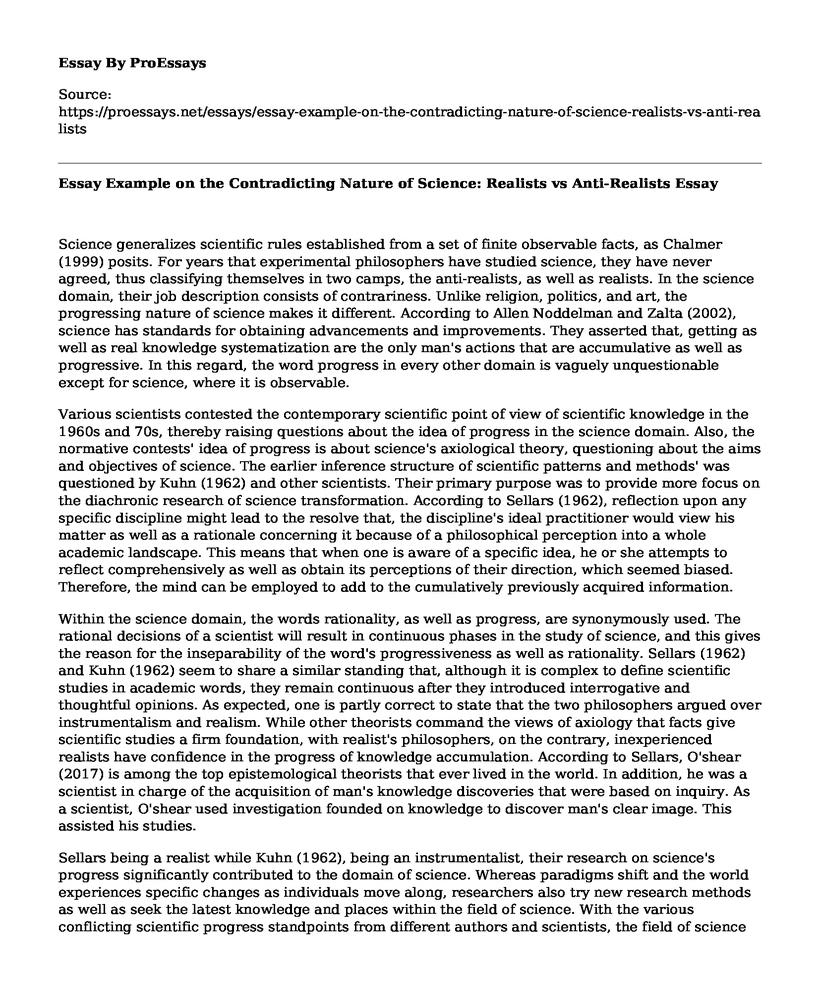Science generalizes scientific rules established from a set of finite observable facts, as Chalmer (1999) posits. For years that experimental philosophers have studied science, they have never agreed, thus classifying themselves in two camps, the anti-realists, as well as realists. In the science domain, their job description consists of contrariness. Unlike religion, politics, and art, the progressing nature of science makes it different. According to Allen Noddelman and Zalta (2002), science has standards for obtaining advancements and improvements. They asserted that, getting as well as real knowledge systematization are the only man's actions that are accumulative as well as progressive. In this regard, the word progress in every other domain is vaguely unquestionable except for science, where it is observable.
Various scientists contested the contemporary scientific point of view of scientific knowledge in the 1960s and 70s, thereby raising questions about the idea of progress in the science domain. Also, the normative contests' idea of progress is about science's axiological theory, questioning about the aims and objectives of science. The earlier inference structure of scientific patterns and methods' was questioned by Kuhn (1962) and other scientists. Their primary purpose was to provide more focus on the diachronic research of science transformation. According to Sellars (1962), reflection upon any specific discipline might lead to the resolve that, the discipline's ideal practitioner would view his matter as well as a rationale concerning it because of a philosophical perception into a whole academic landscape. This means that when one is aware of a specific idea, he or she attempts to reflect comprehensively as well as obtain its perceptions of their direction, which seemed biased. Therefore, the mind can be employed to add to the cumulatively previously acquired information.
Within the science domain, the words rationality, as well as progress, are synonymously used. The rational decisions of a scientist will result in continuous phases in the study of science, and this gives the reason for the inseparability of the word's progressiveness as well as rationality. Sellars (1962) and Kuhn (1962) seem to share a similar standing that, although it is complex to define scientific studies in academic words, they remain continuous after they introduced interrogative and thoughtful opinions. As expected, one is partly correct to state that the two philosophers argued over instrumentalism and realism. While other theorists command the views of axiology that facts give scientific studies a firm foundation, with realist's philosophers, on the contrary, inexperienced realists have confidence in the progress of knowledge accumulation. According to Sellars, O'shear (2017) is among the top epistemological theorists that ever lived in the world. In addition, he was a scientist in charge of the acquisition of man's knowledge discoveries that were based on inquiry. As a scientist, O'shear used investigation founded on knowledge to discover man's clear image. This assisted his studies.
Sellars being a realist while Kuhn (1962), being an instrumentalist, their research on science's progress significantly contributed to the domain of science. Whereas paradigms shift and the world experiences specific changes as individuals move along, researchers also try new research methods as well as seek the latest knowledge and places within the field of science. With the various conflicting scientific progress standpoints from different authors and scientists, the field of science indeed has experienced a significant revolution with time.
References
Allen, C., Nodelman, U., and Zalta, E.N., 2002. The Stanford Encyclopedia of Philosophy: A developed dynamic reference work. Metaphilosophy, 33(12), pp.210-228.
Chalmers, A.F., 1999. What is this thing called science?. Hackett Publishing.
Kuhn, T.S., 1962. The essential tension: Tradition and innovation in scientific research. Scientificcreativity: Its recognition and development. New York: Wiley, pp.341-354.
Kuhn, T.S.,1962. The structure of scientific revolutions. University of Chicago Press.
O'shea, J., 2007. Wilfrid Sellars: Naturalism with a normative turn. John Wiley & Sons.
Sellars, W., 1963. Science, perception, and reality.
Cite this page
Essay Example on the Contradicting Nature of Science: Realists vs Anti-Realists. (2023, May 08). Retrieved from https://proessays.net/essays/essay-example-on-the-contradicting-nature-of-science-realists-vs-anti-realists
If you are the original author of this essay and no longer wish to have it published on the ProEssays website, please click below to request its removal:
- Some Questions on Physics
- Essay on Children Education in Homeless Families
- How to Find Employment After College? - Essay Sample
- Classroom Diversity Essay Example
- Toys: Essential for Child Growth and Development - Essay Sample
- Diabetic Patient - Report Example
- Paper on Unveiling the Roots of Crime: A Criminological Analysis of Kody's Journey into Deviancy







